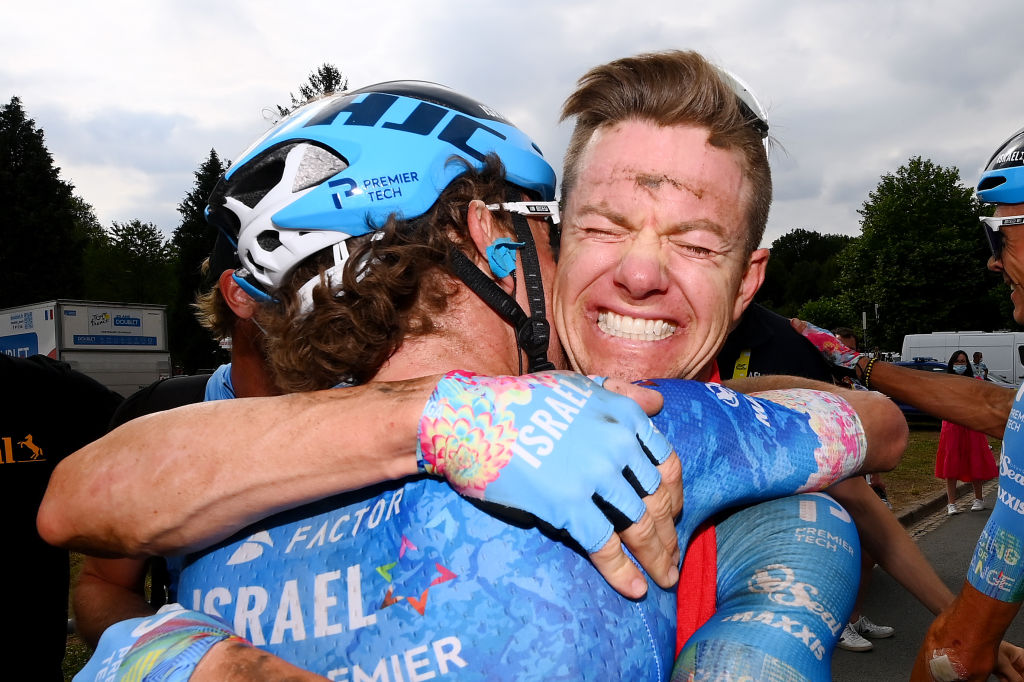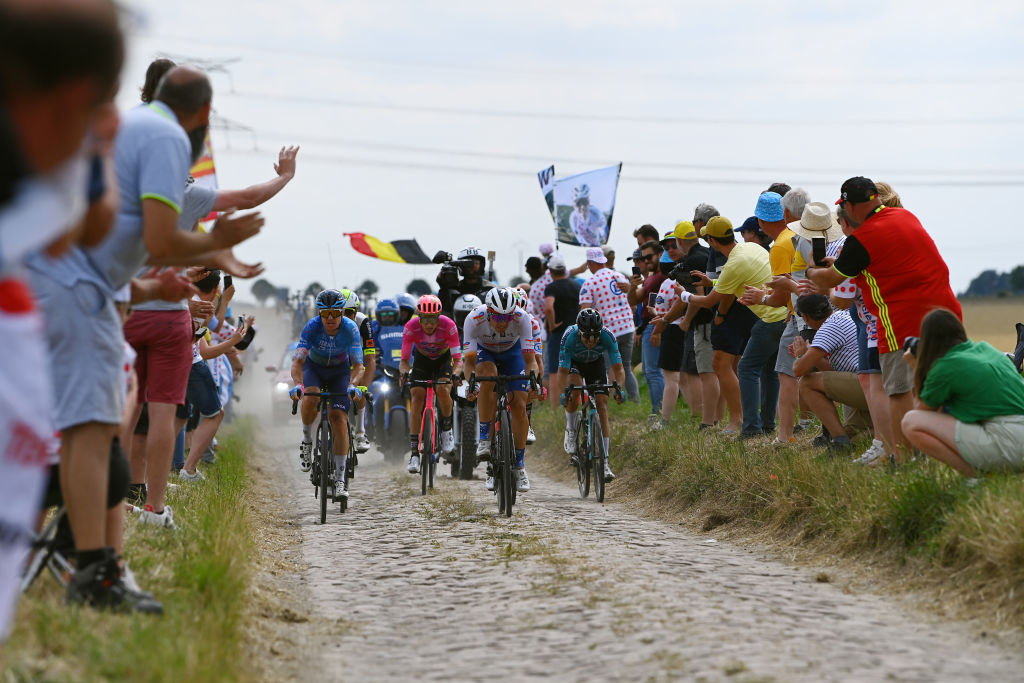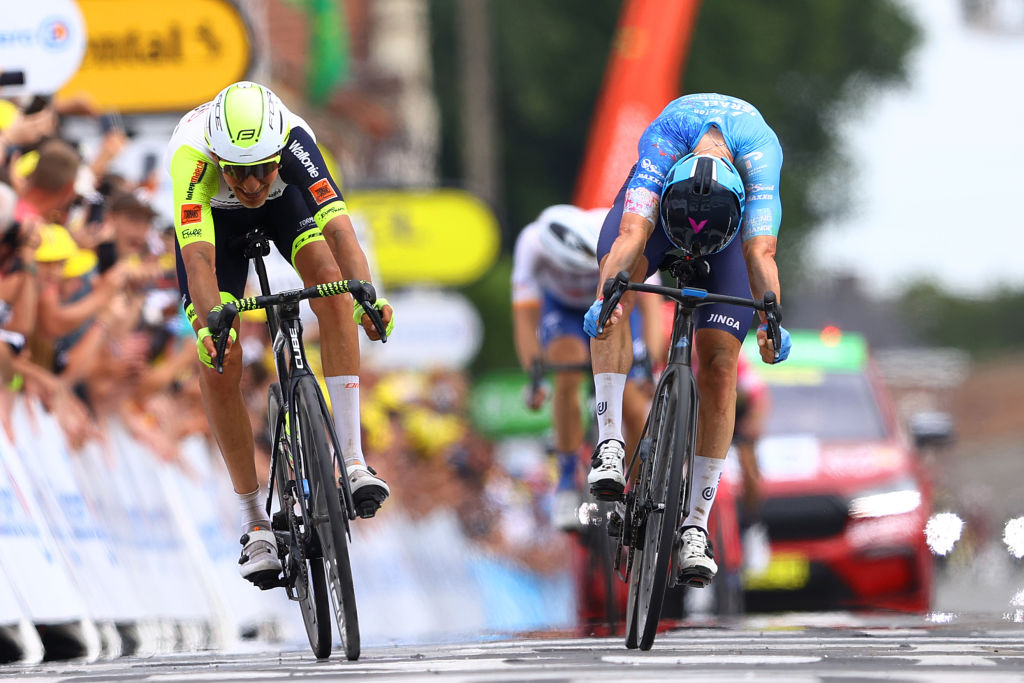From unemployment to Tour glory – How Simon Clarke kept his cool in 2022
'I'm big on just focusing on what you can control' says veteran Australian after life-line deal leads to Grand Tour crescendo

What do a Tour de France stage win and unemployment have in common? In the case of Simon Clarke, they are both testament to the power of drowning out the background noise and zoning in on the moment in hand.
"I think in stressful situations I become even more focused," Clarke says. "Instead of going the other way and freaking out or panicking, I think even more clearly."
Clarke is sitting down with Cyclingnews to recap the 2022 season, surely the most eventful of his 13-year career. He started it without a team, not knowing if he'd have a season at all. He finished it as a Tour de France stage winner, a childhood dream finally come true.
The Australian is in a relaxed and content mood; he's just had one of his best seasons and has a contract for the next one. What a difference 12 months can make. This time last year, he was anxiously looking on as his old team, Qhubeka-NextHash, lurched and then eventually folded. He had a contract for 2022 so hadn't been shopping around, and the devastating news left him "high and dry" just before Christmas.
It must have been a time of great stress and anxiety, but Clarke doesn't quite speak about it in those terms.
"I don't know. I'm always an optimist. I never dwell on the past. Things happen for a reason and sometimes you can just be unlucky," he says.
"I don't tend to look back. I just say 'right, how am I going to fix it?' I don't worry about how it happened or whose fault it was; the fact is you're in that situation and the only way you're getting out is by finding a solution. I don't let the negative thought processes cross my mind."
Get The Leadout Newsletter
The latest race content, interviews, features, reviews and expert buying guides, direct to your inbox!
And so, over Christmas and the New Year, Clarke went out on his bike and trained. It didn't matter that there was nothing concrete to train for, what mattered was the process itself.
"I believed someone would be interested in having a rider like me, so I just figured I'd keep preparing like I normally do. I wanted to be ready if a team gave me the call. I'm big on just focusing on what you can control, so I just tried to stay true to myself and stay as professional as possible."
Perhaps the background stress did have some impact, though. Clarke got to mid-January and when he looked back through his training files, it turned out to be the biggest off-season block he'd done, at least since he started tracking it with Training Peaks six years ago.
"I didn't set out thinking I'm going to train harder than ever, but maybe it happened subconsciously," he says. "I suppose that showed my motivation."
As it turns out, Clarke would have got away without doing all that. He started negotiating with Israel-Premier Tech and signed a one-year lifeline deal on January 9, at which point they just assumed he'd be out of shape and out of sorts.
"They thought they'd just signed a guy off the street who'd need time to find his feet, but they didn't know me personally," he says.
"I did my own kind of solo boot camp in Melbourne over Christmas and New Year, then when I got the call I went straight to a 10-day team training camp, so I'd basically done two 10-day camps in a row. I'd pretty much done a Grand Tour. They were only going to start me in March but they saw I probably had the best form of the team in January."
That much was immediately apparent when the season began. Clarke went to Challenge Mallorca series at the end of January and placed 5th, 3rd, and 6th, going on to finish second on a stage of the Ruta del Sol and then an impressive 11th at Omloop Het Nieuwsblad. He was flying.
That he'd been 'high and dry' just a few weeks previously seemed absurd.
"I don't try and prove anything to anyone. Just to myself that hard work pays off," Clarke says. "I came out motivated on a personal level, not to prove people wrong but to prove to myself I was doing the right things, that I've learned from previous mistakes, and to prove to myself that I've still got it."
'Game on' across the cobbles in France

Fast forward five months and Clarke, despite a spring derailed by illness, lined up for his seventh Tour de France. He has tried for stage wins via numerous breakaways in the past, without success. Until now.
Clarke crossed the line first as the winner of stage 5 and this was not just any stage – it was the cobblestone stage which was one of the most iconic and hotly anticipated of the whole Tour.
"It was always a childhood dream of mine to win a stage. I haven't come out publicly and said it but inside it was one of those lifetime goals," he says.
The very fact that Clarke won that day was a good enough story in itself. But it was how he won it that makes it all the more interesting.
Clarke appeared in complete control, master of his own emotions and the situation as a whole. Previous near misses and the advancing of years might naturally lead to twitchiness, pangs of nervous energy as the enormity of the situation crept in, but not even the callous cobblestones of northern France could rattle Clarke's composure.
"Normally in a breakaway, you get to within striking distance of the finale and your mind starts ticking - 'right, what do I need to do? But the pavé stage was different. I said to myself 'don't even think about the finish until you get off that last sector'," he explains.
"So much can happen before then, that if you start getting carried away about how you're gonna play the finish, you could throw it away. Maybe by thinking about the finish you're not in the moment and that causes you to ride a bad line on the pavé, and you puncture. So I was focused on every sector and then when we pulled off the last one with five and a bit to go, I was just like 'now it's game on'."
Re-watching that finale, what stands out is the amount of scanning Clarke did, his neck muscles given as big a workout as his legs. He explained that previous rounds of homework had already given him a good idea of what his three companions might do, but he kept them under constant surveillance nonetheless.
He knew Neilson Powless would likely launch a late attack and he looked round six times as the American wound it up, having the presence of mind to not get spooked into a reaction but instead to call the bluff of Edvald Boasson Hagen, the fastest sprinter on paper. He had also seen Taco Van der Hoorn launch very long sprints before, so was ready when the Dutchman came over the top with 300 metres to go, sprinting in the slipstream for as long as possible before clawing level and, in unison, throwing his head down and bike forward.

Only when he looked up, the other side of the line, did the significance of it all enter his thoughts.
"I was able to block all that out. None of it even crossed my mind," he says.
"No matter the outside influences, in a race nothing else matters, so just focus on the task in hand and the execution. I was just able to zone in and concentrate on what I needed to in that final."
Although the circumstances differ wildly, it seems to reflect that same mindset of early January.
"I try never to get desperate, because at end of the day desperation is just a perception," Clarke says.
"Instead of going the other way, I actually zone in even more and go 'right, this is a pressure moment, I need to concentrate, have clear thoughts and clear decisions'. One wrong decision and you lose the race. Maybe it is a similar process."
Clarke reached the first rest day in a pretty strong negotiating position when his agent touched down to talk to team managers. By the final week of the race he had a new two-year contract with Israel-Premier Tech in the bag.
The team were struggling to keep their WorldTour status but Clarke, the options in his own hands this time, had few real doubts about staying.
"I'm a faithful person. I appreciate Israel picked me up last-minute when they didn't have to, and I set out all year to try and repay them, in UCI points. And I had one of highest-scoring seasons of my career," he says.
"I wanted to stay with them. When they assured me that, no matter what happened with relegation, the team would be backed 100 per cent and would be continuing, I was happy to sign and stay."
Simon Clarke will therefore race until he's at least 38. How different it nearly was. Professional cycling has a strange habit of allowing talented riders to fall through the cracks, and it's hard to explain how a stage winner at the Tour de France nearly didn't have a team to begin with.
Does Clarke not look back and wonder how that all happened to him?
"I never like to dwell on the past," he says.
Nor does he want to worry too much about the future.
"I just take every situation as it comes, and try to make a positive of it."
Patrick is a freelance sports writer and editor. He’s an NCTJ-accredited journalist with a bachelor’s degree in modern languages (French and Spanish). Patrick worked full-time at Cyclingnews for eight years between 2015 and 2023, latterly as Deputy Editor.
